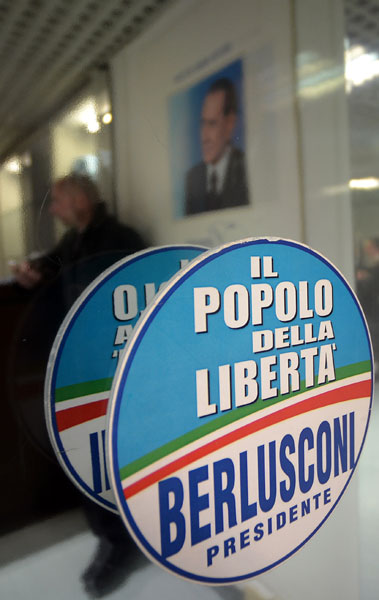Berlusconi hints at alliance with center-left
Updated: 2013-02-27 09:43
(Agencies/China Daily)
|
|||||||||||
 |
|
A portrait of Silvio Berlusconi is seen inside People of Freedom party headquarters in downtown Rome on Monday. [Photo/Agencies] |
Silvio Berlusconi, ex-prime minister and leader of the center-right coalition, on Tuesday hinted at a willingness to negotiate an alliance with the center-left coalition after Italy's parliamentary election produced a rare political deadlock.
"Italy deserves to be governed. ... Now we have to take time to reflect," Berlusconi said in a local TV program when asked about the possibility of making an agreement with the center-left.
The center-left coalition led by Pier Luigi Bersani narrowly won the election in the lower house in order to be assigned to form a new government, according to the count of all domestic votes by the Interior Ministry.
But Bersani did not obtain a majority of seats in the Senate, leaving him the awkward option of allying with either Berlusconi or the Five Star Movement's Beppe Grillo if forming a government.
In the Senate, the projected number of seats is 113 for Bersani, 116 for Berlusconi, 54 for Grillo and only 18 for outgoing Prime Minister Mario Monti.
A party or coalition needs 158 seats in the 315-strong Senate for a majority. The center-left's ideal option would have been allying with pro-reform Monti's centrist party if it had won more seats.
Berlusconi also declared "no agreement with Monti" via his Twitter account, without mentioning that an alliance with Monti would go nowhere anyway due to a lack of combined seats in Parliament.
Italy's government always needs the support of both the lower house and the Senate to govern, which have equal law-making powers.
The center-left could be desperate enough to force itself into alliance negotiations with its rival center-right. Democratic Party Deputy Secretary Enrico Letta said late on Monday that his party would prefer not to have a second election.
Bersani was also quoted as saying that Italy was faced with a delicate situation and that his coalition will manage the responsibilities that "these elections have given us in the interests of Italy".
Global markets have been severely shaken by the prospect of Italy's political stalemate, a prospect that could undermine the stability of the entire 17-nation eurozone.
Since there was no clear winner, European shares tumbled on Tuesday after the election stalemate threatened a renewal of the eurozone crisis, Reuters said.
European leaders pleaded with politicians in Italy to quickly build a government to continue to enact reforms to lower Italy's critically high debt and spare Europe another spike in its four-year financial crisis.
If Italian parties fail to form a governing coalition, new elections will be required, causing more uncertainty and a leadership vacuum, Reuters said.
"What is now decisive for Italy - but, because Italy is such an important country for Europe, also for the whole of Europe - is that a stable government that is capable of acting can be formed as quickly as possible," German Foreign Minister Guido Westerwelle told reporters in Berlin.
In Brussels, the EU's executive on Tuesday said it had heard "the message of concern" sent by dissatisfied Italian voters but expected the nation nevertheless to stick to its pledges of budget cuts and economic reforms.
"We clearly hear the message of concern expressed by Italian citizens," European Commission spokesman Olivier Bailly said at a news conference, in response to questions over the impact of EU-agreed economic austerity policies on the outcome of the Italian election.
But "Italy has made commitments vis-a-vis the commission and other member states, on the reduction of its deficit, on the reduction of its debt, and on a number of other pledges of structural reform.
"As far as we are concerned, these commitments remain, they are Italy's commitments, and the commission expects Italy to honor its commitments," he said.
Martin Schulz, the head of the European Parliament, also said on Tuesday that Italy's election results are a message of protest over the tough austerity policies pushed by some in the European Union.
"It is a very difficult result for the EU as a whole," Schulz said.
"What happens in Italy affects us all. We need a stable government in one of the most important countries in the EU," he added.
Xinhua-AFP-Reuters
Related Stories
Berlusconi sex trial halted until after election 2013-02-12 10:55
Berlusconi considers a return to politics 2012-07-12 07:31
Berlusconi still tries political influence 2012-10-30 13:12
Today's Top News
Police continue manhunt for 2nd bombing suspect
H7N9 flu transmission studied
8% growth predicted for Q2
Nuke reactor gets foreign contract
First couple on Time's list of most influential
'Green' awareness levels drop in Beijing
Palace Museum spruces up
Trading channels 'need to broaden'
Hot Topics
Lunar probe , China growth forecasts, Emission rules get tougher, China seen through 'colored lens', International board,
Editor's Picks

|

|

|

|

|

|





